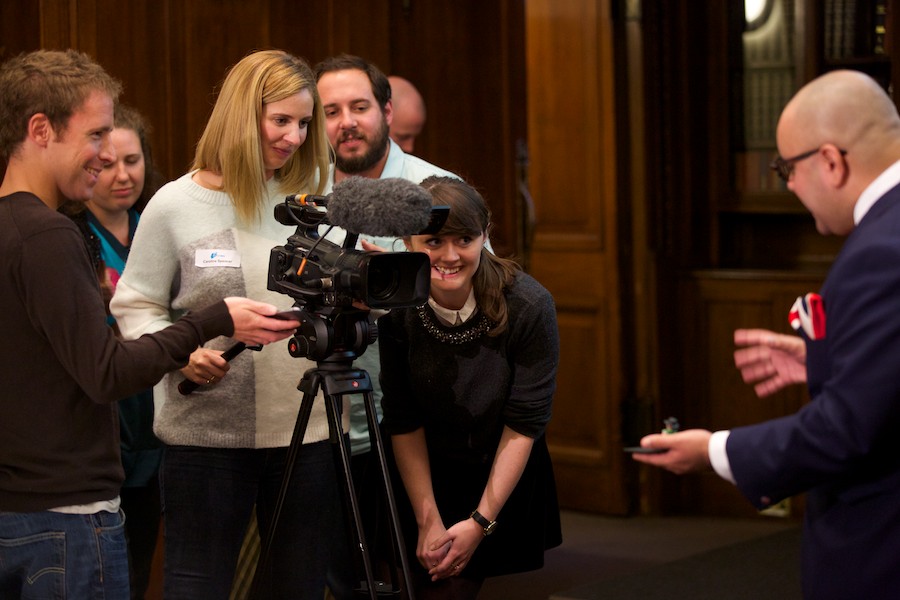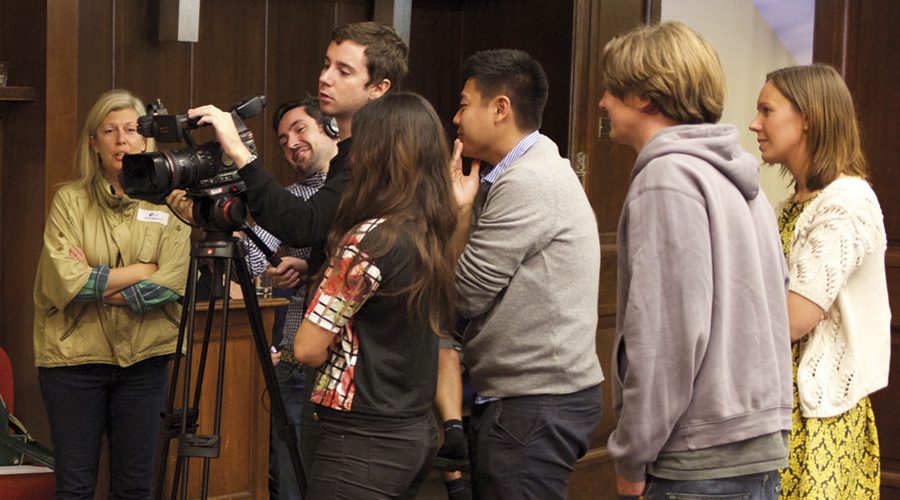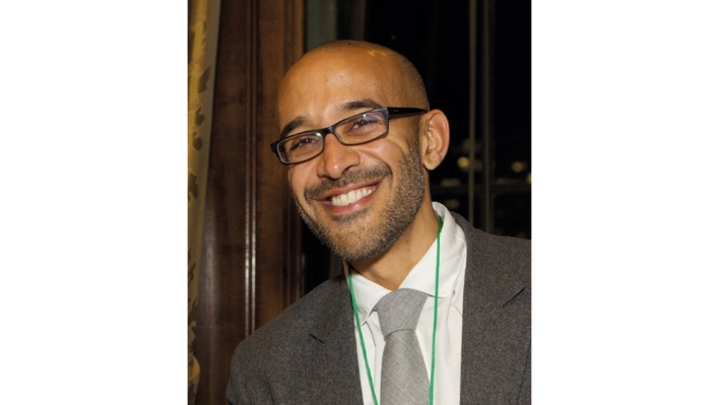How do researchers and assistant producers go about developing this vital skill? Matthew Bell supplies the answers
Self-shooting is rapidly becoming a key part of the job description for researchers and assistant producers working in television’s factual arena. But with training thin on the ground, how will tomorrow’s TV talent learn to shoot their own material?
Help was provided by a recent RTS Futures event, “Shooting stars: a beginners’ guide to self-shooting”. A panel of self-shooters, chaired by executive producer Matt Bennett, offered advice, while training in basic camera skills was provided by Pro Motion Hire.
Attendees at the sold-out event in central London were taught how to shoot with the Canon XF305 camera, widely used for documentary, reality and other factual entertainment shows.
At the end of the evening, the RTS Futures members were let loose to test their new skills, shooting short pieces to camera.
“No longer do we [necessarily] need cameramen and women who’ve gone through years of training to operate very complicated cameras,” said Bennett, whose credits include Channel 4’s The Island with Bear Grylls and Sky 1’s Ross Kemp: Extreme World.
Shooting producer/director Dave Minchin, bound for Italy the next day to work on the BBC Two property series, Escape to the Continent, told the audience: “If you can shoot, that’s going to give you a competitive edge.
“Even if the job isn’t a shooting role, if I was hiring, I would probably go for the person who could pick up a camera and use it.” Minchin broke into TV as a runner, first in entertainment and then in factual. “From the beginning, I made it clear that I loved shooting and that I’d been into photography as a teenager. I kept on badgering people until, eventually, I got to shoot some GVs [general views, or establishing shots],” he said.

Assistant producer Amy Harrison, who works with Minchin on Escape to the Continent, believes that possessing the ability to film has broadened her TV horizons.
“I wouldn’t be going to Italy tomorrow if I couldn’t shoot – I’d be in the office setting things up for other people. I’d be dissatisfied if that was my only involvement in making TV,” she said.
Harrison’s first job in TV was as a development intern at TalkbackThames before moving into production as a location researcher on BBC Two’s Escape to the Country.
Is it the end of the line for non-shooting crew? Lewis Hatfull, a self-shooting senior researcher working on Channel 4’s First Dates, admitted that there was “a new wave of senior researchers, and probably even researchers and runners, who can technically handle cameras”. But he added: “I still know loads of assistant producers who can’t shoot. They seem to be happy with setting shoots up and casting.”
However, he reckoned that in his factual entertainment genre, “the days are gone when you can be a director but not shoot – there’s no money for that. I speak to a lot of producers who wish they’d picked up cameras earlier on.”
Hatfull pinpointed the appeal of being a self-shooter: “The first time your footage is used in a programme, the feeling is amazing. There’s so much to think about.
“If you’re a pure self-shooter, you’ve got sound [to worry about], you’re directing, you’ve got a contributor who has gone off the rails or who isn’t talking. That can be challenging, but it’s really satisfying when you nail it.”
For Minchin, the attraction lies in being “the master of your own destiny – you’re controlling the picture, the tone and the content”.
Hatfull won a place on Channel 4’s production trainee scheme, before moving to independent producer Dragonfly. There, he gained self-shooting experience. He received formal training with Channel 4 and Dragonfly, including attending camera courses.
“Try and get on them – they are great. I could not have afforded to do them at my level on my own,” he said. However, Hatfull cautioned: “It was great to do the training, but there’s nothing like getting out into the real world. Looking back, I think I’ve learned more on the job.”
Hatfull has been lucky, in contrast to Minchin, who said: “I’ve been in the industry for eight years, directing for five, and the only formal training I’ve had is in how to lift boxes – that’s not a good thing.
“If you can get training – great, but you can train yourself. Get your hands on cameras, ask questions, talk to people.”
Bennett asked whether camera talent was innate or could be developed through hard graft.
“You can learn the technical things, but some people are naturally better than others. However, I don’t think it should deter you, if you don’t think you’ve got a natural eye,” reckoned Minchin.
And, of course, good TV is more than pretty pictures. “At the end of the day, if everything is beautifully shot but the content isn’t there – that’s no good,” said Hatfull. “You’d rather have the content.”
The RTS Futures event, ‘Shooting stars: a beginners’ guide to self-shooting’, was held at the Hallam Conference Centre in central London on 6 October. The producers were Emily Gale and Grace Owen.
Self-help for self-shooters
Dave Minchin: ‘Everyone makes mistakes… I’ve lost a tape – although you guys will probably never see a tape in your careers, you might delete some footage.
‘I’ve organised a day of pieces to camera underneath Heathrow’s flight path… When you lose a tape, you learn very quickly not to do it twice. No one’s perfect – don’t let your mistake destroy you… learn from them.’
Amy Harrison: ‘Believe in yourself. Looking back at my career, there were many times when I felt out of my depth… When I got my first shooting assistant producer job… whether it was cross-shooting or main camera [work] on some of the smaller sequences, it was scary… I had to work on my self-confidence.’
Lewis Hatfull: ‘You’ve got to be hard-working – telly loves a grafter… Don’t turn down opportunities, especially [if you’re] at my level.’
Dave Minchin: ‘Learn to shoot with the camera in manual mode because that’s the way your footage will stand out from everyone else’s.
‘Anyone can press “auto” and know that it’s going to be all right, but once you’ve learnt the controls of a camera, which takes time, you’ll have full creative control over it.’
Lewis Hatfull: ‘Get feedback as soon as possible [on what you’re shooting]… you need to know how to improve. [The feedback] can be horrific, but the only way to learn is to know what you’re not doing right.’
Amy Harrison: ‘Be resilient, because so many people want to work in TV… you have to keep going and getting jobs. When you’re on a shoot it can go badly… you might [be tempted] to throw in the towel, but you’ve got to keep going.’
Dave Minchin: ‘Watch stuff: films, music videos, commercials – even art and paintings can be an inspiration for your shooting.’
‘Pick up a camera whenever you can – practice makes perfect. When it comes naturally, you then have time to think about storytelling and composing your shots.’
Training for self-shooters
The south London-based broadcast equipment hire outfit Pro Motion trains newcomers to use the high-definition, BBC-approved Canon XF305.
According to the company’s Business Support Manager, Jude Prior, the camera is the ‘industry workhorse’ for factual and observational documentary programming.
‘It’s a fixed-lens camera, so you can just point and shoot. It’s very much a broadcast-approved camcorder,’ she explained.
During the evening, Pro Motion’s technicians ran through the basics for the RTS Futures audience.
They were shown how to set up the camera and tripod and the basics of lighting, framing, exposure and focus.
‘There is a massive skills gap in the industry and I don’t think there’s enough training given to people starting out,’ said Prior. ‘If you can sell yourself as a shooting assistant producer, more doors will probably open for you.
‘There will always be a need for specialists in camera, lighting and sound – we don’t train people to be those things. But budgets these days mean that companies need people who can do everything.
‘You’re getting people at as low a level as runners being asked to pick
up a camera and shoot.’
Pro Motion, which is almost a decade old, has worked with most of the UK’s leading broadcasters and independent production companies.
Question & answer

Q
Can you use the Canon XF305 widely across TV?A Dave Minchin: [It’s used] for a lot of observational documentaries. It’s about four years old now… but it’s an industry standard [camera] for low-budget and self-shooting. It’s one of the best ones to be learning on…
There are a lot of cameras out there but once you know the basics of one camera, it’s fairly easy to learn the other ones. Every camera works on the same set of principles.
A Lewis Hatfull: The Canon XF305 is still the workhorse – if you can learn on that camera, you will be fine.
Q How can I practise if I don’t have access to a broadcast camera?
A Dave Minchin: Even with consumer cameras, you can put a lot of them on manual mode [and learn about] the iris [which controls exposure] and shutter speed… It’s about getting your head around [the science] and then you can translate that into much fancier cameras.
A Lewis Hatfull: In terms of shot composition and coverage, you can practise on an iPhone… You can edit that stuff as well. You don’t need all the fancy kit.
Q What’s the best sequence you’ve shot?
A Dave Minchin: It was for Hunting Britain’s Most Wanted, a one-off for Channel 4 [Cutting Edge documentary strand] about finding [European] murderers hiding out in London. The day [involved] sitting in a police car for six hours, doing nothing.
They spotted the guy – I was running through the rain, the light and sound were horrible, members of the public were screaming at me… I was filming someone’s freedom being taken away in front of his wife and it was horrible. But when I look back at it, shooting a good sequence with everything against me was really rewarding.
Q What more do you need on top of technical knowledge?
A Amy Harrison: You’ve got to press all the right buttons at the right time, but you’ve also got to make it happen in front of the camera, especially when you’re on your own. You’ve got to know how to work with people and get the content.
A Dave Minchin: Aside from the technical bits, the most important thing is being good with people and that’s with people from all walks of life, not just your colleagues… [including] the unruly kids in the background trying to ruin your shot.







